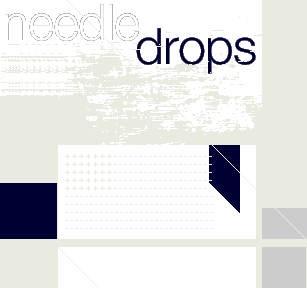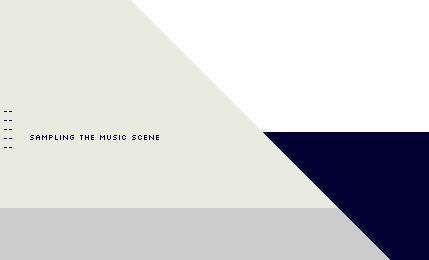


++ Contact Philip Sherburne ++
++ Recently ++
Tuesday, November 29, 2005 = The Stooges Unearthed (Again)
Tuesday, November 8, 2005 = Documenting Beulah And DCFC
Tuesday, November 1, 2005 = Out-Of-Control Rock 'N' Roll Is Alive And Well
Tuesday, October 25, 2005 = Just In Time For Halloween
Monday, October 3, 2005 = The Dandyesque Raunch Of Louis XI
Monday, August 15, 2005 = The Empire Blues
Tuesday, August 9, 2005 = David Howie's Sónar Diary
Monday, July 25, 2005 = Hot Sounds For Summertime
Monday, June 27, 2005 = Overcoming Writer's Block At Sónar 2005
Monday, June 4, 2005 = Cool New Sounds To Download Or Stream
++ Needle Drops Archives ++
View full list of Needle Drops articles...
|
|
 |
Friday, July 21, 2003
++ Cornering Dizzee Rascal, Part One
++ We could paraphrase a line from the Notorious B.I.G., paraphrasing Slick Rick: "Dizzee Dizzee Dizzee, can't you see? Sometimes your words just hypnotize me." At least, that's been the perspective of the "blogosphere" — the online community of critics that's been salivating over Dizzee Rascal ever since "I Luv U" appeared on London pirates (and, shortly thereafter, on filesharing services), and in a single stroke, offered an entirely new future for UK Garage to listeners out of range of the London pirates. Simon Reynolds has been a leading voice in the discussion, alongside bloggers like Luka, Skykicking (whose installment this week on 8-bar garage is a must-read for anyone with an interest in the genre), and K-Punk, as well as the din over at the I Love Music boards. Next week, Dizzee's debut album, Boy in da Corner, gets its official release (in the UK, anyway; no U.S. release date has been announced), giving the public at large the chance to hear what the hubbub's about.
Much like Mike Skinner's project The Streets last year, and like the fellow pirate MCs and producers with whom he rolls, 18-year-old Dizzee Rascal, a member of London's Roll Deep Crew, proposes Garage not so much as dance music as a UK mutation of hip-hop. Like The Streets, Dizzee's style favors first-person narratives, although in his case, they concern not working-class malaise but life in the estates, or projects, with a dystopian realism that echoes U.S. hip-hop's grimmest documentarians, as well as Skinner's work.
However. While Mike Skinner's album, Original Pirate Material, sounded like the output of a kid who had logged many hours locked in his bedroom listening to the pirates, Boy in da Corner — on which Dizzee tackles both production and MC duty — comes through like the transmission that blows poor Skinner's speakers. (And I love Original Pirate Material.) And more importantly, any discussion of Dizzee Rascal that hews too closely to the hip-hop argument is bound to fail. Dizzee may not align himself with UKG any more ("I ain't UK garage so get used to it," he spits over pipsqueak staccato samples on "Vexed," which inexplicably was left off the album), but it's still a London t'ing, synched to two-step's house-tempo, syncopated swing — even though, in the newest incarnation of the genre, the beats have slowed down to half-speed.
But really, this is all beside the point; I say it all now to get it out of the way. Because Dizzee's record is one of the year's highlights in any genre, wherever you choose to class it. The micro-moments collected and collated here are each more than the sum of their parts; separately and severally, the astonishing details peppering Boy in da Corner banish the backstory to the margins. Three and a half minutes into the Billy Squier-sampling, Joe Jackson-referencing "Fix Up, Look Sharp," when Dizzee says, "This could get hectic," the beat drops out in mid-word, leaving a gaping silence against which the final click of the "c" sounds out like a trigger, or a diamond tapping glass. Unintentional? Maybe. It hardly matters; the moment is so fraught with pure sonic pleasure that it rivals both the most detail-attentive productions of "experimental" dance music and the most exquisite moments in pure pop. Everything you need to know about Dizzee Rascal is right here.
The first thing that distinguishes Dizzee is his voice: the voice of a teenager, it's at once nimble and clumsy, cracking octaves every other syllable or so. Reynolds has pointed out that the crux of Dizzie, even more than his lyrics, is the tone of his voice: "wounded/wounding, vulnerable/vindictive, fragile/explosive." On "Vexed," he's every bit as pissed as he swears he isn't. He wraps that lanky drawl around spiky syllables that poke through with short, sharp stabs. He's not afraid to whine, and he's not afraid to brood. "I'm showing you my life a little deeper than you think/ Some nights I get a little less sleep than you think/ Something keeps me up, I can't even get a wink/ And there's no point in trying, so I lay there and blink/ I'm showing you, I feel more stressed than you see," he raps on "Vexed," sounding like someone grudgingly throwing crumbs of self-awareness over the couch to the unwelcome shrink.
Dizzee Rascal's lyrical turf, primarily, is life in the East London projects. It's pretty grim stuff — and also delivered in an oddly detached manner, avoiding gangsta rap's B-movie violence in favor of suggestion and stunned reticence. "Sittin' Here," which opens the album over an ominous, vaguely Asiatic string cadence, plays nostalgia ("It was only yesterday none of us could ever come to harm/ It was only yesterday life was a touch more sweet") off the dead-end realism of petty crime and police presence, but for the most part, Dizzee leaves the gunshots and sirens buried in the background to flesh out the cinematic details.
In fact, Dizzee's a surprisingly taciturn MC. "I'm just sittin' here," he confesses — "I ain't saying much, I just watch... I watch all around, I watch every detail" — but he refuses to tell us what he sees, saying only, "I watch so hard I'm scared my eyes might fail." There's that vulnerability Reynolds mentioned: Dizzee doesn't trust himself to be a ghetto raconteur, and even his snapshots are torn and smudged by the constant worrying of his hands.
|
| |
|